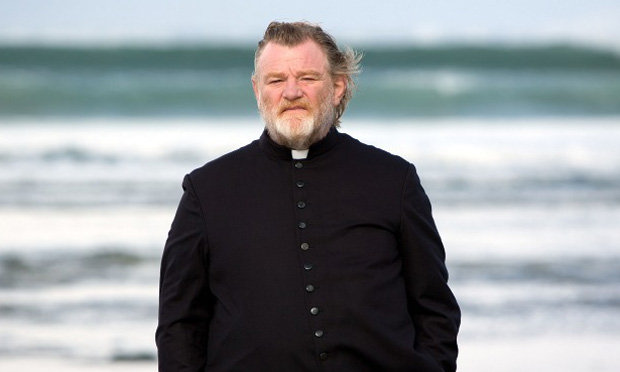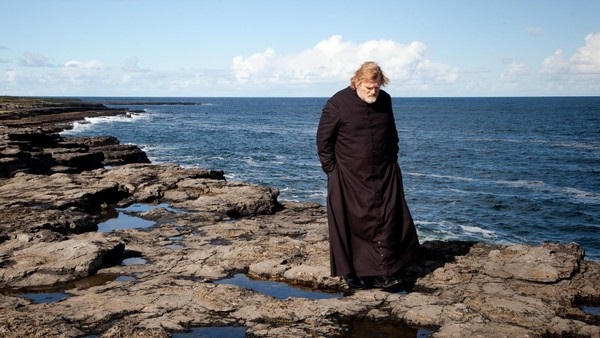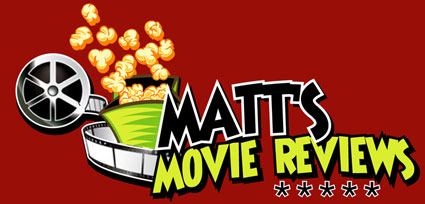When writer/director John Michael McDonagh released his theatrical debut The Guard back in 2011, he announced himself as an uncompromising new talent unafraid to take on taboo subjects with his biting wit and un-PC attitude.
Now the Irish filmmaker returns with Calvary, a dark black comedy-cum-murder mystery about good parish priest Father James Lavelle (Brendan Gleeson), who is given one week to live by a mysterious parishioner who has threatened to kill him due to the sexual abuse by another priest decades earlier. Father Lavelle must find who the killer is within a community where one citizen is as messed up as the other.
Matt’s Movie Reviews spoke to John Michael McDonagh about the inspiration for Calvary, the reaction by Catholic’s to the film, his idea of casting comic actors and his working relationship with Brendan Gleeson.
Enjoy!
Calvary opens with a quote from St. Augustine: “Do not despair; one of the thieves was saved. Do not presume; one of the thieves was damned.” Did you have that quote in mind before you started writing the script of did it come to you afterwards?
I had the idea for the script, and then I came across that quote. I started off as a writer and I used to try and write novels, so I was always a big fan of having the epigraph at the start of the book, and I though that’s not used in films often and I would like to bring that back. It can veer into pretentiousness if you’re not careful, but I think it’s such a good quote and it kind of sets up the movie.
I also had the idea of having the epigraph over black and then you can gradually bring Brendan (Gleeson) face in from the black, so I thought that could be a good start for the film.
There have been many films made that are about or touches on the sex abuse crisis in the Church, but rarely do you find one where a priest is presented as “good”. What was the inspiration for this direction?
Well I thought there were gonna be…I talked to Brendan about this, that I bet that they’re gonna be making lots of movies about all the scandals, and they’re all probably gonna be this banal, moralistic, boring movies about bad priests, and I said we should do the exact opposite. Do a film about a good priest, because you know they are all “wrongful” people…and he was really taken by the idea. He said he had sort of a mentor figure when he was growing up who really helped him, or whatever.
It’s an interesting narrative to me to have, because most thrillers aren’t driven by good characters. Genuinely good, un-ironic people. It’s usually the kind of anti-hero or a conflicted person who drives a film. So I thought this could be an interesting starting point for the movie, and with the thriller hook, the kind of who’s gonna do it, who’s threatened to kill him, I thought that could be in a bleak way approaching what is a quite dark subject matter.
 |
“Most thrillers aren’t driven by good characters. Genuinely good, un-ironic people. It’s usually the kind of anti-hero or a conflicted person who drives a film. So I thought this could be an interesting starting point for the movie” - John Michael McDonagh |
When you write a character like Father Lavelle – a Catholic priest who preaches his beliefs with conviction – do you research much in the way of Catholicism and how Catholic clergy approach there vocation? Does that change any perceptions?
No I wouldn’t do a lot of research on movies. I’m not a big believer in it, to be honest. I don’t know whether because I’m lazy or what, but I find it to be a bit…most films that are heavily researched I found them to be a little bit dead in some ways. But if you look at it this way I was an altar boy until I was about 11 or 12, and my brother was a choir boy and we did have interaction with priests when were young… you can call it ‘backstage’, you know when you’re getting prepared for mass and all of that kind of stuff.
So I more or less took that away from it rather than getting into any in deep research project. We did bring a priest in just before we started shooting to ask him technical questions and stuff like that, but that would have been the extent of it.
Speaking as a Catholic, this film spoke to me because it represented a different group in the Catholic sex abuse crisis: those Catholics on the outside looking in. Have you had any feedback from Catholics, particularly clergy who reacted the same way?
Not of a sort of official thing. The only sort of anecdotal evidence I’ve got was the actor Gary Lydon, he plays the inspector who has the gun and everything, he lives in Ireland and he was taking his two young boys to mass, and he says the local parish priest shook his hand before mass started and congratulated him on the movie, and during the sermon on the mass said what a great movie it was and everybody should go and see it.
Obviously that is just one individual, but from the critical reviews we’ve had in let’s say Christian based press and everything, it’s all been pretty positive I think. You know the situation is those kind of scandals aren’t gonna go away and there is no point in ignoring it anymore. It should be dealt with and the impression I get is they’re glad there is a film that deals with it in an even handed manner.
I mean the film to me is not an anti-religious film, it’s an anti-authoritarian film. I think you can be a religious person and then come away and having enjoyed the film or got something out of it, and you can also be an atheist and come away from the film and got something out of it. It’s not there to wag a finger at either side, to be honest.
That’s the thing about great films. It doesn’t matter who they are or what they do, it’s what we take from it.
Yeah, but it’s also that’s to me is how I approach my writing. Everyone is an individual, everyone has their reasons…you know, the great Jean Renoir quote, “Everyone has their reasons.” That’s always my approach to filmmaking, no one is a pure villain and no one is a pure hero, really.
Calvary deals with a very dark issue, but it can be very funny as well. Did you ever think it risky to inject humour into a movie that deals with such a dark subject?
No…I have a tendency…in The Guard there was quite a lot of confrontational humour as well. When I write I basically don’t second guess myself or analyse what I’m doing. I just write straight through and I write quite quickly. It would be more when I’m in the editing stage I examine scenes, but I really to be honest never think “Have I gotten too far?” I only think in the sense of “Is this scene working or is it not? Is that joke funny or is it not?” I never think about “Is it too much? Will this offend people?” That doesn’t really occur to me. That’s when you’re kind of censoring yourself.
Because let’s face it some people will be appalled by something that to us would think is irrelevant, you know? Some people are appalled by swearing. I’m not. But it’s fine if they are. It’s up to them. But does that mean you don’t write a character who swears a lot? (laughs) You can’t judge yourself in that way. So I just try not to overanalyse what I’m doing and leave that for other people to do.
 |
"I find (Brendan) to be an egoless actor. That everything is for the best for the film. He’s not someone who wants more close ups or anything like that, or is ungenerous to other actors. He just wants whatever is best for the movie." - John Michael McDonagh |
Comedians such as Chris O’Dowd, Dylan Moran and Pat Shortt are in the film. Did they keep things lively on the set?
Yeah, that is the thing. The whole idea of the clown who wants to play Hamlet and they’re actually very sad people I don’t find to be true at all, they’re actually very good fun to have on the set. Let’s face it, they don’t feel they’re taken seriously enough as actors just because they do a lot of comedy. So when they’re given a neat little dramatic part that has comedy in it they jump up at the chance and are all incredibly focused.
But then of course on a Friday night they are really good fun to go out and have a drink with when you’ve had a long week shooting. Also you kind of wrong foot the audience because they may be expecting one thing and they get something completely different. I’ve always liked kind of the instincts of the comic actor, and their timing, and the way they deliver lines, I find it slightly different to an actor who’s been in drama school.
What type of difference is there between an actor with a comedic background as opposed to someone with a heavily dramatic one?
I think to me instinctively when I’m watching them there is something about their timing and the way they deliver a line. I mean (laughs) sometimes someone like Dylan Moran will be so loose that you wonder if he’s gonna remember any of his lines, you know? Chris O’Dowd would be more of… you know, he’s knows all of his lines, he’s on it all the time, and he would improvise around them, play around and sometimes that will work and be great, and sometimes you want to just go back to the text.
So there is a slightly different energy I guess around them…I guess you could call it an improvisatory quality.
In regards to that improvisation, do you encourage that type of thing in regards to your script? Or is the script the scripture that people must stick too while filming?
Yeah, I don’t really encourage it. I don’t mind if it happens and something good comes out of it. But the way I approach it is I spent the last year and a half preparing this film and thinking about it, and it’s unlikely you’re going to show up on the day and come up with a better line than I have thought of. (laughs) That’s the way I look at it. Everyone now and again they might but I find it to be a rare occurrence.
And the other thing is what you remember about actors is if an actor will get away with getting one line in a scene he’ll walk away telling his friends he co-wrote the script (laughing). So I really don’t like to encourage it.
This is the second time you directed Brendan Gleeson. What is it about Brendan as an actor and a person that you are drawn to as a filmmaker?
Well he is very committed person and an actor. Very professional. Brings gravitas to everything he does, I guess. He’s very prepared. I mean he’ll be on set with his script in a big manuscript folder with loads and loads of notes, and he’ll be going back and forth on set. And obviously other actors see all that, they see the kind of forensic preparation, I’d say, and I guess it kind of makes them raise…not the they wouldn’t have raised their game anyway, but it makes them realise how committed he is and how committed they have to be as well, so I guess it raises the bar of everyone around him.
I find him to be an egoless actor. That everything is for the best for the film. He’s not someone who wants more close ups or anything like that, or is ungenerous to other actors. He just wants whatever is best for the movie, and so say when I sent him early cuts of The Guard his notes would be very sort of generous. If a scene would be better if it’s on another actor than on him, he’d say you should go that way. So all of his notes are selfless, I found. He obviously leaves you to trust the actors and trust their instincts.
Will there be another collaboration between you two?
Yeah, we’re planning to do one next year called The Lame Shall Enter First. We made a film about a policeman and a priest, and this one will be about a paraplegic. So Brendan will be in a wheelchair in South London solving a murder mystery. It will have the same kind of scabrous, black humour that’s in both The Guard and Calvary. I call it the “Glorified Suicide Trilogy”.
Very nice. Will you hopefully in a few years from now see this in a nice box-set?
Yeah, that’s the thing isn’t it? It’s an easy hook. It’s an easy marketing hook.
|
